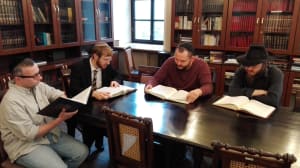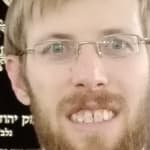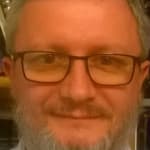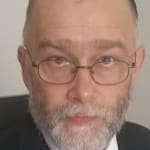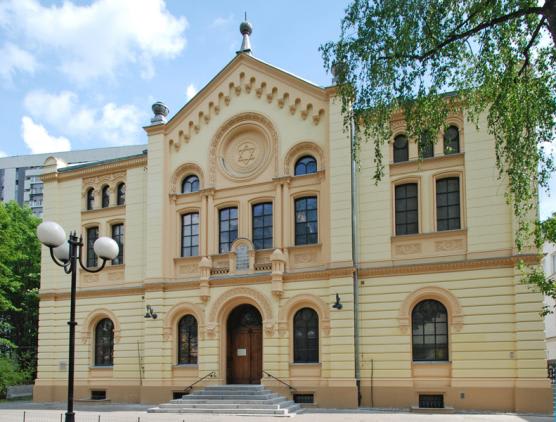Standing on the site of the Warsaw Ghetto, it’s hard to believe that this very place where Jews fought to their deaths to preserve Jewish life, has now become the epicenter of a Jewish renaissance in Poland. But what is now even more astonishing is that some of its very leaders were often ignorant of their Jewish roots until later in life and sometimes were even raised as Catholics.
Walk into Warsaw’s Nozyk Synagogue in Warsaw, the only shul that survived the Nazi ravages, and you’ll see that the shul is packed. ‘Jewish Poles’ are coming for Torah classes, prayer services and Yom Tov celebrations – searching, desperately, for the heritage nearly lost to them.
Their ancestors were among the few thousand concentration camp survivors who chose to remain in Poland after the war. Unfortunately, their Jewish identities didn’t. For decades, they hid the truth, from their Gentile spouses, their children, their grandchildren.
Rabbi Michael Schudrich, Chief Rabbi of Poland“Fear is a powerful emotion,” says Rabbi Michael Schudrich, today’s chief rabbi of Poland. In 1990, Schudrich was sent by the Ronald S. Lauder Foundation to seek out the Jews left in Poland who were
interested in exploring their Judaism. He found them. And each one had a story to tell.
“I was at a funeral a few months ago for a woman in her nineties,” he says. “Her 60-year old son told the people standing around the grave: ‘I know some of you are wondering why we are here at the Jewish cemetery.’ His mother had been in the Warsaw Ghetto. Her entire family was murdered. She never spoke about being Jewish until she was in her seventies. The last sentence of his eulogy: ‘Mother, now you are resting in the Jewish cemetery; you don’t have to be afraid anymore.’”
In 1939, 3.3 million Jews lived in Poland. Today there are an estimated 30,000. Rabbi Schudrich and his growing congregation of late-bloomer Jews are determined to rebuild Poland’s Torah infrastructure – starting with Warsaw, once home to 393,950 Jews. It housed Poland’s largest Jewish community, a community which comprised one-third of the city.
With every effort, they continue to pick up momentum. “The community members mostly started from zero,” says Rabbi Moshe Bloom, who heads the community kollel, comprised of students and baalei batim who learn in the Nozyk synagogue every day from 9:00 a.m to noon. “Every one of them discovered their Jewish origins later in life. They’re not sure what to do with the knowledge. Most of them come to speak with the rabbi or someone actively Jewish in the community. Our goal is to bring them closer.”
Aside from the weekly classes, the shul holds a regular Friday night community Shabbos seudah drawing over 70 participants,
as well as Shabbatons. “They all start out saying, ‘Wow I’m a Jew; what does it mean? They search on the Internet, the library, the cemeteries,” says Rabbi Bloom. “One person showed me his great-grandfather’s grave. He told me this is the place where he feels the most Jewish. For him that was his connection.”
The Warsaw community currently boasts a mikveh, kollel, and Lauder-Morasha day school (established by the Ronald S. Lauder Foundation). With the current enrollment at 240 students from the ages of 3-16 and a staff of 80, including 50 teachers, the school is the first under Jewish auspices in Warsaw since 1949, and is the only Jewish school in Poland today.
As Warsaw’s Jewish community grew, with five kosher restaurants opening and a growing number of Orthodox Union (OU)-certified food manufacturers, there was an urgent need for mashgichim. In 1996, OU Kosher introduced the Harry H. Beren ASK OU Mashgiach Training Program, a summer program which has trained close to 1,000 mashgichim, many of whom serve in leadership positions with kosher agencies across North America, Israel, and other Jewish communities around the world.
Schudrich, as the OU’s Rabbinic Field Representative overseeing the production of Poland’s OU-Kosher certified manufacturing plants, encouraged three of the community’s longtime members to register for the upcoming program: Curiel Kowalik, Yitzhak Moshe Krakowski, and Michael Samet.
Kowalik’s journey began at 16, when he decided to deepen his spirituality. Although raised Catholic, he began attending the Nozyk synagogue’s shiurim and religious community activities. When he decided to convert, his mother realized she ought to tell him the truth about her background: She was a Jew.
Kowalik, a co-founder of the Lauder-Morasha Jewish Day School where he served as the Jewish Educational Program Director, currently heads the Museum of the History of Polish Jews Educational Centre.
Unlike Kowalik, Krakowski, a fellow ASK OU participant, discovered his Jewish roots on his father’s side. His father, a Holocaust survivor, married a staunchly Catholic Polish woman. Nevertheless, Krakowski gravitated to Judaism.
“In Polish society, if you know you have some Jewish background, it touches you,” says Krakowski. “If someone tells a joke about Jews in your presence, you’re affected.” Eventually he converted. He studied at yeshivot in Israel, and then returned to Poland to assume an active leadership role in the growing Warsaw community.
“I’m called a professional Jew,” jokes Krakowski, the gabbai of the shul, who also serves on the executive board of the Polish Jewish Community, the Religious Affairs Committee, and frequently assists Rabbi Schudrich with his mashgiach duties.
Samet, the third Warsaw participant in ASK OU, was born in Gdansk, a city left virtually empty of Jews. Samet travelled to Warsaw to learn Torah, and eventually returned to Gdansk to rebuild Jewish life from the ashes. Today, the city’s synagogue, used as a furniture warehouse after the war, functions as Jewish headquarters, open for prayer and educational services.
Along with his duties as longstanding member of the board of the Union of Jewish Religious Communities in Poland, Samet also served as the president of the Jewish Community of Gdansk and works in partnership with The Heritage Foundation for Preservation of Jewish Cemeteries and the Committee for Preservation of Jewish Cemeteries in Europe.
Approximately 100 Jews are registered as official members of Gdansk’s Jewish community. Samet presumes there are many more in the area who are either unaware of their heritage or afraid to reveal it.
“Wherever Jews are, we must build a community,” he says. “We can better fulfill the mitzvos, whether it is praying with a minyan, reading from the Torah, or participation in festivals. Gdansk is home to one of the only synagogues still standing in this part of Poland. It is our responsibility to preserve it.”
He aims to inspire the community to learn about Yiddishkeit by living as an example. He considers kashrus education, and its application, a pivotal part of that mission.
“Knowing how to practically apply the halachos and gaining an understanding of the complexity of modern food production are essential tools for Jews in Poland,” says Rabbi Menachem Genack, CEO and Rabbinic Administrator of OU Kosher. “By training our leaders we’re helping to spread this knowledge throughout the Jewish communities there.”
One of the first ASK OU graduates, Rabbi Joshua Spinner, founding director of Yeshiva Beis Zion in Berlin (sent in 1997 by Lauder to strengthen the German Jewish community), urged his talmidim to follow suit. Two of them graduated from ASK OU, and went on to earn semicha.
“Those graduates continue to strengthen kashrus standards in Germany,” says Rabbi Yosef Grossman, OU senior rabbinic coordinator and director of OU Kashrus Education. “We hope to generate the same success this year in Poland.”
By Bayla Sheva Brenner



